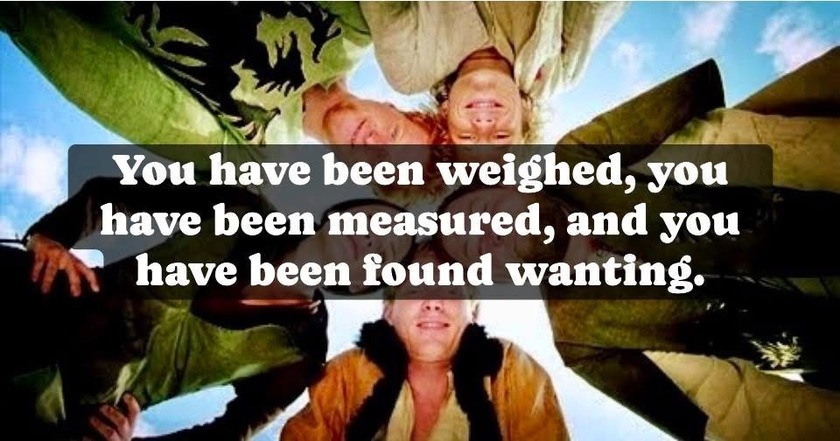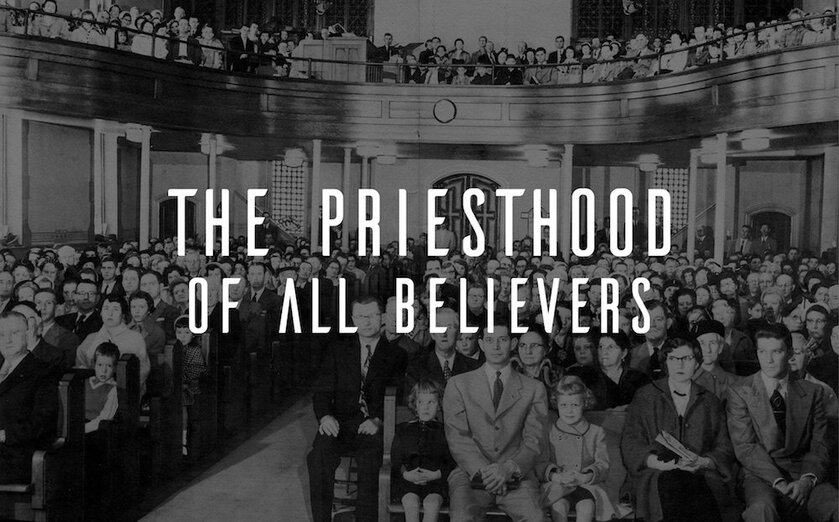God’s Higher Perspective in Our Trials: Striking a Balance Between Dignity Amid Depravity
Acts 21:27-28
When the seven days were almost completed, the Jews from Asia, seeing him in the temple, stirred up the whole crowd and laid hands on him, crying out, "Men of Israel, help! This is the man who is teaching everyone everywhere against the people and the law and this place. Moreover, he even brought Greeks into the temple and has defiled this holy place."
This scene, and what followed, echoes the trials faced by Jesus Himself; false accusations, stirred-up crowds, and a rush to judgment without evidence. Paul’s predicament reminds us that following God’s call often invites opposition, especially when it challenges traditions or expands our spiritual boundaries. Paul wasn’t anti-Jewish; he was in fact there in order to fulfill his vow in the temple as a devout Jew. Yet his inclusive message of grace for all nations (Jews and Gentiles alike) threatened their status quo. In Acts 21:36, the mob pursuing Paul shouts, "Away with him!" This echoes the words of the crowd during Jesus’ trial in John 19:15, where they cry out, "Away with him, away with him, crucify him!" The parallel highlights how Paul’s suffering mirrors aspects of Jesus’ own persecution, emphasizing themes of rejection and faithfulness amid opposition.
Paul’s journey to Jerusalem, despite warnings of impending danger (Acts 21:4, 10-14), was driven by the Holy Spirit’s guidance (Acts 20:22-23). He knowingly walked into the trial, declaring his readiness to suffer for Christ’s name (Acts 21:13). This wasn’t random misfortune but part of God’s orchestrated plan. God's Sovereignty here means God isn’t caught off guard by our trials; He permits and even directs them toward a greater end. We may not know whats coming next, or even anticipate the dangers, but we can rest assured that God does.
Check this out:
Let's fast forward for a minute. As the story progresses, the trial escalates: Paul stands before the Sanhedrin (Acts 23:1-10), where division among his accusers buys him time. Then, the Lord appears to him in a vision, affirming,
"Take courage, for as you have testified to the facts about me in Jerusalem, so you must testify also in Rome" (vs.11).
This reveals God’s hand: the arrest, far from derailing Paul’s mission, propels him toward Rome, the heart of the empire, where he can proclaim the Gospel to influential audiences (Acts 24-26, before Felix, Festus, and Agrippa).
Foreknowledge could have eased Paul's anxiety, built up his confidence, or even altered his approach. It might have even been good for Paul to know these things earlier on, but The Lord has a different point of view about that. Scripture reveals that God operates from a vantage point infinitely superior to ours, one that prioritizes eternal outcomes over immediate comfort.
The Lord’s "different point of view" is beautifully captured in Isaiah 55:8-9
"For my thoughts are not your thoughts, neither are your ways my ways, declares the Lord. For as the heavens are higher than the earth, so are my ways higher than your ways and my thoughts than your thoughts."
This emphasizes the vast gap between our human understanding and God's divine wisdom. God’s plans aren’t limited by our linear timelines, our emotional needs, or our very finite logic. We may be made in His image, but much of the similarities ends there. Our level of understanding is very subjective. Our appreciation for the comprehensive complexities of God's eternal design is extremely wretched.
Why? Why wretched?
God doesn’t operate within the confines of our desires for predictability or ease. Our understanding is wretched because its foundations are built on our subjectivity. His vantage point transcends our limited horizons, focusing on eternal ramifications that ripple far beyond our immediate circumstances. With God, this isn’t about withholding information to test us arbitrarily; it’s about cultivating a faith in us that thrives in dependence on Him, not on a scripted outcome. The prophet Isaiah captures this divine otherness vividly. God’s thoughts and ways aren’t just slightly elevated, they’re as incomparable as the heavens are to the earth which is a part of that same universe.
We share God's attributes like creativity, morality, and relational capacity, but there the parallels largely fade. Our comprehension is inherently subjective, colored by personal experiences, biases, and the fog of our finite existence. We grasp fragments of truth, but our ability to fully appreciate the intricate, multifaceted layers of God’s eternal design often falls woefully short; described in Scripture as "wretched" in moments of raw honesty, like Paul’s lament in Romans 7:24 about the human condition.
Some might say that it's wrong to view the human being as wretched, that we are the "image bearers", and therefore we should give reverence to that shared nature. And to an extent that's true. We should appreciate our design. There has to be something greater in the human creation since our Creator has blessed us by making us in His image. Something He called "very good".
Every so often we should reflect on His work in our regard:
Genesis 1:26-27, 31
"Then God said, ‘Let us make man in our image, after our likeness…So God created man in his own image, in the image of God he created him; male and female he created them… And God saw everything that he had made, and behold, it was very good.’"
And Paul remarks:
Romans 7:24
"Wretched man that I am! Who will deliver me from this body of death?"
Well...that's exactly the point. Paul is expressing his desire to be God's image bearer, but realizes how much he doesn't bear enough of God's image. He doesn't understand God's will fully. He isn't able to comprehend the complexity of His divine mind, because he's human afterall. He's recognizing that it's humanly impossible for him to understand all that he wishes he could. And this doesn't separate him from God's grace. It's not going to change his faithfulness. If anything, he's going to strive all the more because of this realization.
Look what happens:
Without full disclosure, Paul’s faith was refined through real-time reliance on the Spirit, leading to authentic growth and powerful witness. God’s superior logic allowed the trial to unfold in a way that maximized impact: from Jerusalem’s chaos to Rome’s courts, the Gospel advanced precisely because Paul navigated the unknown with trust in God's abilities, not his own. This mirrors broader biblical patterns, where figures like Job (Job 38-42) or the disciples post-resurrection (John 16:12-13) received revelation progressively, ensuring their responses glorified God rather than human ingenuity. See, that's the danger of us thinking a little too highly of ourselves. If we knew the whole story before it played out, along the way we'd starting thinking we were the architects of that plan.
So, in essence, God’s sovereignty shines brightest when we surrender our need for control. Our "wretched" (or inadequate) grasp of the divine plan isn’t a flaw to despise but an invitation to humility, pushing us toward awe and obedience.
I don't want to know the entire story. I'm not interested in being kept up to speed on all the details in advance. I'm not trying to be God. I gave that over to Him long ago.
Listen:
God’s plan accounts for countless souls saved, multitudes of characters forged, and kingdoms built, all outcomes we might undervalue in our quest for personal comfort and ease. Or worse, take credit for.
2 Corinthians 4:17-18
"For our light and momentary troubles are achieving for us an eternal glory that far outweighs them all. So we fix our eyes not on what is seen, but on what is unseen, since what is seen is temporary, but what is unseen is eternal."
Our views are tainted by emotion and circumstance; God’s are pure, holistic, and unchanging, not swept up by various winds of change. The beauty of this faith relationship is God's divine information unfolds for us as needed, building intimacy with God. We are on a need to know basis, and that's a good thing.
Deuteronomy 29:29
"The secret things belong to the Lord our God, but the things that are revealed belong to us."
Yet, this isn’t the full story. Critics rightly caution against overemphasizing wretchedness, lest we diminish the dignity bestowed upon us. This Imago Dei (image of God) endows us with echoes of His essence. We’re not mere accidents but intentional masterpieces, blessed with dominion over creation. It's a lie of the devil to believe otherwise.
Yet, we need a balanced understanding of the human condition.
The tension resolves in Christ. The Fall marred the image God created...
Romans 3:23
"for all have sinned and fall short of the glory of God."
...introducing wretchedness, but redemption restores it.
Colossians 3:9b-10
"...you have put off the old self with its practices and have put on the new self, which is being renewed in knowledge after the image of its creator."
Paul, even in his lament, immediately rejoices in deliverance through Jesus. Similarly, in his trials, Paul’s human frailty highlighted God’s strength (2 Corinthians 12:9-10), turning weakness into a canvas for divine glory. We honor our design not by denying our flaws but by stewarding our God-given attributes humbly, always pointing back to the Creator and giving Him the glory. We give Him our crowns of righteousness that were really only His to begin with.
In daily life, strike this balance:
When self-doubt creeps in, affirm your Imago Dei, perhaps by creating something meaningful or extending grace in a relationship. When pride swells, confess your wretchedness and rejoice in Christ’s renewal. Amid trials, like Paul’s, let weakness draw you closer to God’s sufficient grace. Share this truth with someone battling low self-worth, pointing them to their Creator-given dignity.
Prayer:
Lord Jesus, You who perfectly bear the Father’s image, thank You for creating us as intentional masterpieces, very good in Your sight. Forgive us for overemphasizing our wretchedness or ignoring it. Help us hold the tension in balance. Through Your redemption, renew our marred image, turning weaknesses into displays of Your strength. May we steward our attributes humbly, always pointing to You and laying our crowns at Your feet. In Your Holy delivering name, Amen.




















